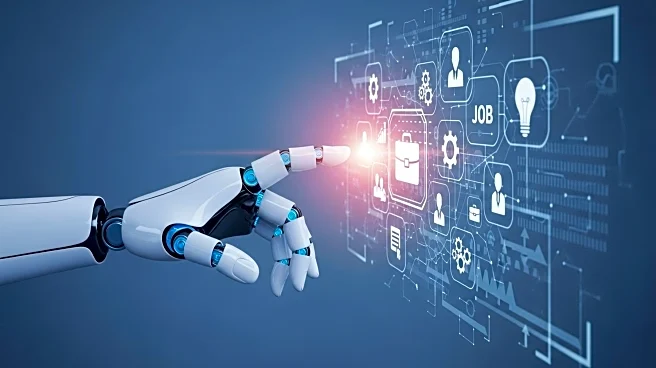What's Happening?
At TechCrunch Disrupt 2025, Mercor co-founder and CEO Brendan Foody is set to discuss the transformative role of artificial intelligence in the workforce. The session will focus on how AI is reshaping hiring practices, talent access, and the development of AI-augmented teams. Mercor, backed by investors like Peter Thiel and Jack Dorsey, has rapidly grown its revenue run rate from $1 to $500 million in just 17 months, highlighting the swift changes AI is bringing to the labor market. Foody will address how AI can help companies match with elite technical talent, build distributed hiring models, and emphasize the importance of upskilling in the global economy. The session aims to provide insights into how startups and enterprises can leverage AI to access new talent pools, reduce hiring biases, and prepare workforces for future challenges.
Why It's Important?
The integration of AI into hiring processes is significant as it can potentially revolutionize the way companies recruit and manage talent. By utilizing AI, businesses can streamline their hiring pipelines, access a broader range of candidates, and create more diverse and inclusive work environments. This shift is crucial in a global economy where technical skills are increasingly in demand. Companies that effectively harness AI for hiring can gain a competitive edge by building more agile and skilled teams. Additionally, the focus on upskilling reflects the need for continuous learning and adaptation in the workforce, ensuring employees remain relevant in an evolving job market.
What's Next?
As AI continues to influence hiring practices, companies may increasingly adopt AI-driven tools to enhance their recruitment strategies. This could lead to more widespread use of AI in identifying and nurturing talent, potentially transforming traditional HR functions. Stakeholders, including business leaders and policymakers, may need to address ethical considerations and develop guidelines to ensure fair and unbiased AI applications in hiring. The ongoing dialogue at events like TechCrunch Disrupt will likely contribute to shaping future policies and practices in workforce management.
Beyond the Headlines
The use of AI in hiring raises important ethical and legal questions, particularly concerning privacy and bias. As AI systems become more prevalent, there is a need to ensure they do not perpetuate existing biases or infringe on candidates' privacy rights. Companies must navigate these challenges carefully to maintain trust and integrity in their hiring processes. Furthermore, the long-term impact of AI on employment may lead to shifts in job roles and the creation of new opportunities, necessitating a focus on education and training to prepare the workforce for these changes.









